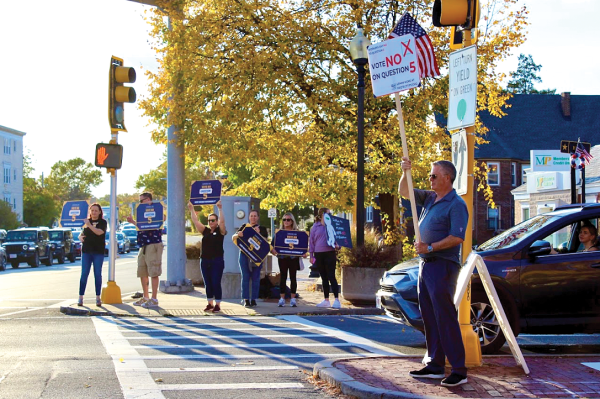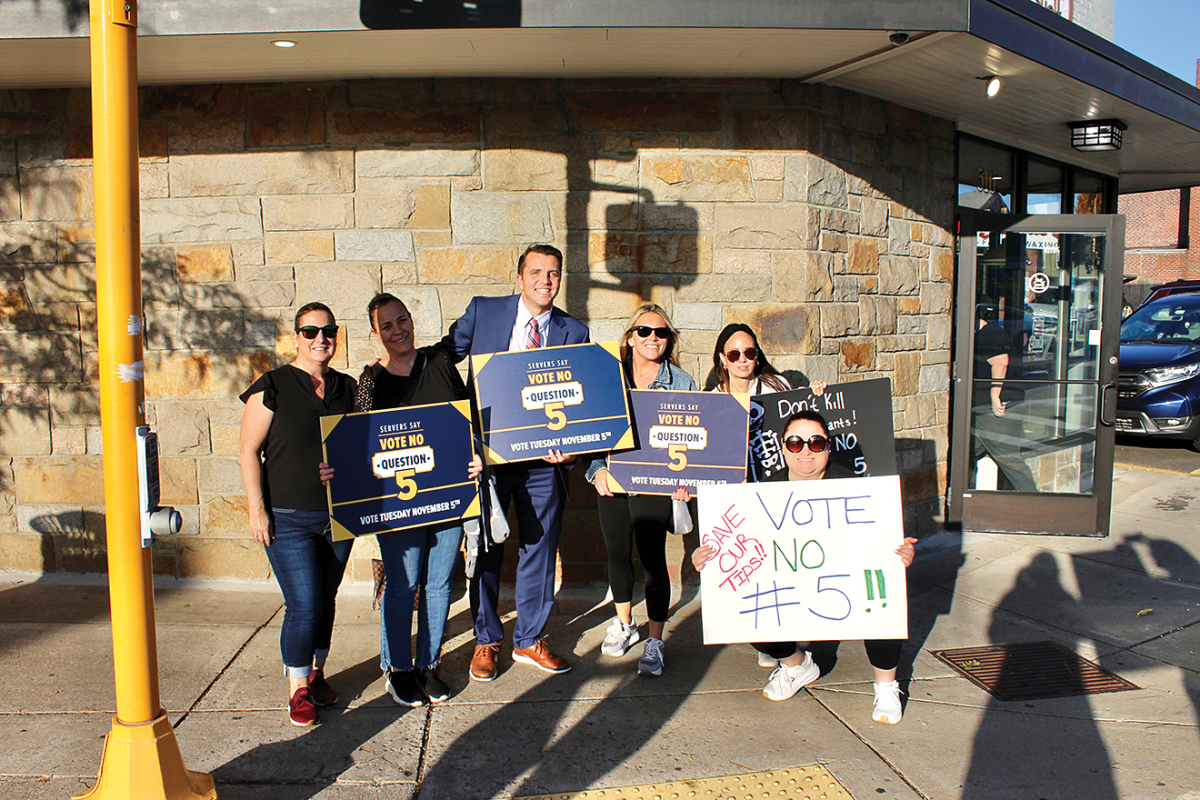October 30, 2024

The anti-Q. 5 stand-out in Adams Village last week. Cassidy McNeeley photo
As rush-hour traffic piled up at the always busy Adams Village intersection last Wednesday afternoon, restaurant owners and their employees took to the street corners to urge motorists to vote against ballot question No. 5 that would increase the minimum hourly wage an employer must pay a tipped worker in Massachusetts.
Currently, the minimum wage for tipped employees in the state is $6.75 an hour, with a catch in the law. If tips acquired plus the $6.75 don’t add up to $15, the employer is required to make up the difference. The minimum wage for non-tipped employees is $15 an hour.
A “yes” vote on Question 5 would support incrementally raising the $6.75 wage until it becomes $15 in 2029. A “no” vote, which many servers seem to support, would keep things as they are now.
About 30 people who oppose the initiative’s stance stood out on the edges of Granite Ave., Gallivan Blvd., and Adams Street where they converged with signs encouraging those passing by to listen to the servers who are urging a “no.”
Neil Levine, owner of Maguire’s Bar & Grill in Easton, was met with supportive beeps from drivers.
“Question 5 is one of those things where you look at it and it seems like a well-intentioned law or piece of legislation until you dig deep into the numbers,” said Levine, who resides in Mansfield. He argues that mandating higher wages will negatively impact many businesses, including eateries in Dorchester.
“If Question 5 passes, a neighborhood like Adams Village will be devastated. Places like the Eire Pub, Molinari’s, The Landmark, and Lucy’s, these places are going to get crushed,” the 60-year-old restaurateur told The Reporter. “We’re already in a tough economy and this will increase operating costs. It will mean higher prices for consumers, and it will mean places that are struggling to survive will close.

Boston City Councillor John FitzGerald (center), who opposed Question 5, joined a stand-out with other opponents in Adams Village last week. Cassidy McNeeley photo
“Instead of the waitresses that are doing great, instead of making minimum wage like this thing proposes, they’re going to be collecting unemployment,” he added.
Grace McGovern, the leader of the pro-Q. 5 group One Fair Wage, is on the other side. “The entire rest of the world has figured out how to operate not on subminimum wages. Here in America, we have seven states plus DC and Chicago that operate with one fair wage plus tips on top,” said McGovern, who noted, “We have over 100 restaurants in Massachusetts who practice one fair wage plus tips on top who have done so successfully while also competing against the same restaurants down the street that pay less than half of their cost in wages.”
McGovern and her allies say that raising hourly pay will prevent wage theft and decrease harassment. But Tran Le, owner of Pho Le in Fields Corner, isn‘t buying that position.
“There is verbiage out there that explicitly says employees working in Massachusetts must be paid a minimum of $15 [an hour.] If that minimum is not met, the employer must make up for the difference,” said Le. “To say that employees are being paid subminimum wage is false.”
But some, including part-time bartender Evan George, say the employers don’t always do their part.
“There are many laws that restaurants and bars are supposed to follow that for one reason or another, they simply don’t,” said George, who lives in Dorchester. “If it’s the end of the night, the closing manager is just going through the receipts to figure out the payout; they’re not going to go figure out the hour breakdown.”
But other servers who spoke to The Reporter worry that the ballot question will backfire.
“We get $6.75, but if the day is slow, they have to pay us minimum wage,” said Tara Folan, a Dorchester resident and longtime waitress at Newcomb Farms in Milton, who was part of last week’s stand-out in Adams Village. “The average person doesn’t know that, so they think, ‘Oh, I’m doing something nice by voting yes.’ But they’re not.”
Folan has worked at Newcomb’s for 25 years and said she could not support her family without the tips she earns. “My husband is fully dependent with a brain injury; I take care of him. He can’t work so I’m the only breadwinner in the house. For me this is the way I can work, afford to pay the bills, and take care of him at the same time.”
Folan says her extra income is a result of the relationships she has cultivated with regular customers. Question 5 could take these tips away from her.
In addition to increasing hourly wage, a “yes” vote on Question 5 will give employers the authority to mandate a “tip pool” that combines all the tips given by customers to tipped workers and distributes them among all workers. While this is already an option in restaurants across the state, the new legislation would include non-tipped workers, meaning tips will be shared with the back of the house, too.
“I have customers who are my regulars who I have relationships with and now I’m supposed to be like, ‘Okay, you take that money.’ It doesn’t make sense,” Folan said. “Not all people are equal in their serving abilities, and I’m supposed to share that?”
Douglas Bacon, owner of Red Paint Hospitality Group, grew up working in restaurants and now owns eight of his own, including The Kenmore in Boston and Hobson’s Bar and Kitchen in Allston.
“People in the back of the house don’t share in the tips. I don’t think they should share in the tips because they don’t deal with the customer in the front of the house,” said Bacon. “If you’re including the people in tips who have no interactions with the guests, it just becomes a service charge.”
He added: “If someone comes in and the food stinks but the servers are friendly and show they care, the customer will come back. But if the service stinks, they are not coming back.”
Marco de Laforcade, who tends bar at Birds of Paradise in Brighton, thinks a better solution to Question 5 would be establishing a union like that proposed for transportation network drivers in Question 3.
In the meantime, de Laforcade, who supports Question 5, isn’t worried about tips.
“Most people aren’t looking at a ballot or legislation to decide what they are going to do. Tipping culture is so strong that people do it anyway.”
Maria Blasi, owner of Blasi’s Kitchen and Bar in Adams Village, isn’t convinced. “I employ 35 people and 20 of them are servers,” said Blasi. “I can barely make my payroll now never mind put 20 more other people to $15 an hour. People don’t think that’s a lot of money, but it’s a lot. I would have to raise prices or add a service charge.”


